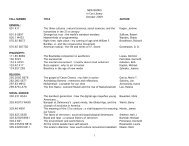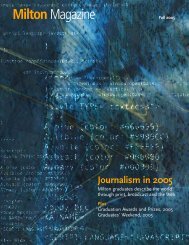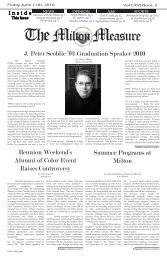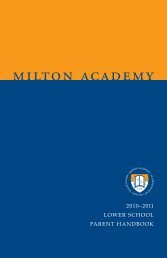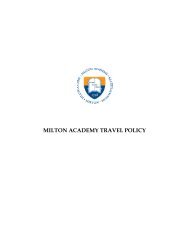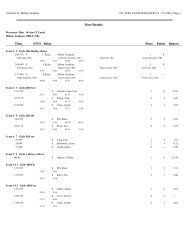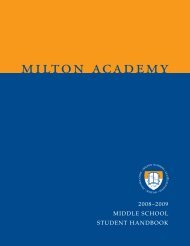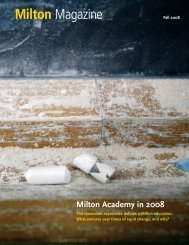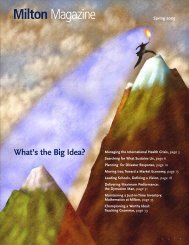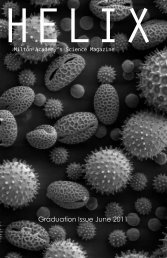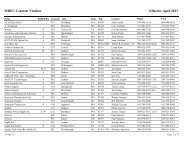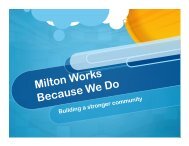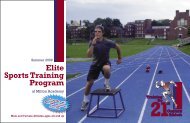Spring 2007 - Milton Academy
Spring 2007 - Milton Academy
Spring 2007 - Milton Academy
- No tags were found...
Create successful ePaper yourself
Turn your PDF publications into a flip-book with our unique Google optimized e-Paper software.
nects 200 students in weekly service at28 sites, including the <strong>Milton</strong> area andBoston. Every student on the CommunityService Board manages the relationshipswith the adults at one or two sites. Thatmeans—with Andrea Geyling’s training—they determine the site’s needs, check inperiodically about how the <strong>Milton</strong> studentsare doing there, and help evaluate whatwent well and what might be changed.Through parents, local graduates andWeb sites, students find—among Boston’sriches—the speakers, experts in a field,practitioners or advocates who will cometo campus to engage with students atdebates, Straus Desserts, club meetings orfundraisers. “They find the speakers, theyinvite them, they make the arrangements,do the promoting, and then introducethem to the crowd when they come,” saysSally Dey of the History Department, advisorfor students on the Public Issues Boardwho plan Straus Desserts.Of course, guiding students who like toact as independent agents provides some“teaching moments” for the advisors, aswell. The email that wasn’t appropriatelycrafted, the follow-up that wasn’t definitive,the details that might have been morehelpful, the assumptions that were faulty,the conversation that needed morefinesse—these are “effective” mistakes:that is, you must own them, they stick inyour memory, they change how you dosomething the next time.Another area that advisors watch carefullyat <strong>Milton</strong> is students’ intense desire toengage each other and the adults inwrestling with the complex ideas andevents of our time. The debates that surgethrough online conferences, whether theystart in the Young Republicans conferenceor class conference (each Class, IVthrough I, has its own conference), sometimeserupt into the campus mainstreamconversation. Lessons about honest dialogue,respect for others’ points of view,the effects of carelessly written opinions,understanding your role in a community:these are frequently difficult, but if handledwell, by skilled teachers, coaches andstudent leaders, these can turn into lifeskills that seem rare enough in the adultworld. Involved students make gains inpolitical sensitivity and savvy, communicationskills, and resilience (learning not totake everything personally).34 <strong>Milton</strong> MagazineStudents want to talk about things.Common Ground, the group that promotescross-cultural dialogues and activities,is running the second year of asuccessful film series. Students pick filmsthat involve issues like class, gender, sexualorientation, physical ability and disability,and race—Real Women Have Curves,School Ties and Good Will Hunting. Theyarrange the couches in Straus to promotecomfortable group viewing, thinking anddiscussing. They market the series, attractthe group and then facilitate the conversation.Typically, 50 students participate inthese Friday-night events. THIN, theaward-winning film of recent visiting artistand photographer Lauren Greenfield,drew a full house.The groups’ leaders moderate difficult conversations,and students often teach theirpeers more directly. Under the umbrella ofthe Public Issues board, a smaller group(80 students) work on the Model UN program.This group participates in threemajor weekend-long conferences eachyear. The first is at Harvard, where 2,300students participate from around theworld; the second is the New York NationalHigh School Model UN (NHSMUN), heldat the UN building, and the third is a Mayconference in Boston, sponsored by theUN Association of Greater Boston andheld at Northeastern University. Studentsmeet nearly weekly to prepare one anotherfor these conferences. They do researchand develop position papers, which theboard meets to review. Two students, AliciaDriscoll and Olivia Greene, teach thenewer students techniques involved indeveloping excellent position papers forthe model UN meetings.In many ways, these students are likethose of earlier generations: energetic, caring,and curious. They are quite differentin one significant way, however. They aredigital children. Unfazed by what may beunfamiliar, they know exactly how to findand use information. Part of their wiringtells them that whatever they need is withintheir reach, that there are many ways tothink about solving problems, that thereare people around the world they can seeand “talk to” about anything at all. TheInternet is a source of knowledge andpower, and they are familiar with usingboth.Students may start out ahead of faculty intechnological fluency, but they have roomto grow in many areas. These activitiesgive students a chance to get their handsdirty (literally, if they’re active in Habitatfor Humanity), work side-by-side withother socioeconomic groups, witness theimpact of their decisions, and learn how toreflect on what they’ve observed. Othermore complex and subtle learning opportunitiescome their way as well. DavidSmith (English Department) mentionsthat the leaders learn to cultivate successors;Heather Flewelling (Director ofStudent Multicultural Programs) notesthat they can learn how to generate buy-infrom the rest of the community. Heatherhas also observed that students learn to listento other positions, not “solely for thepurpose of gaining the counterpoint. Theyneed to understand different perspectivesto design a successful strategy.”Elected leadership has its own learningcurve. Students in the Self-GoverningAssociation find that having power is notalways easy. Knowing more, being on theinside track, becoming aware of a picturebigger than most students see, has a downside.Students have to absorb flak, forinstance, for not delivering on a promise,or for understanding why a promise can’tbe fulfilled. They are accountable, as well,for disciplinary decisions, because they sitas equals in a committee evenly dividedbetween faculty and students—an experiencethey particularly value.If working with students in these manyways seems very time-consuming, it is.Helping students achieve a balancebetween what they’d like to do, what theyneed to do, and what they can do, is oftendifficult. When students are passionateabout their interests, helping them see theneed to pull back from something is atough sell. Faculty need to insist uponaccountability, physical presence, and theidea that they’re not in this alone: theirfriends and the community depend uponthem.The dominant experience, as one facultymember put it, is “amazing relationshipsbetween students and adults all over campus.”Undertaking all these projects andprograms is consistent with <strong>Milton</strong> values.“We have a high-powered intellectual communityhere,” Heather sums up, “and thisoutside-of-class activity is a normal part oftrying on identity—finding out who I am.”CDE



